HVAC Companies East Barnet
Find Heating and Cooling Services in East Barnet
Receive 3 FREE Air Conditioning Services quotes for your project today! Compare profiles, reviews, accreditations, portfolio, etc... and choose the best offer.
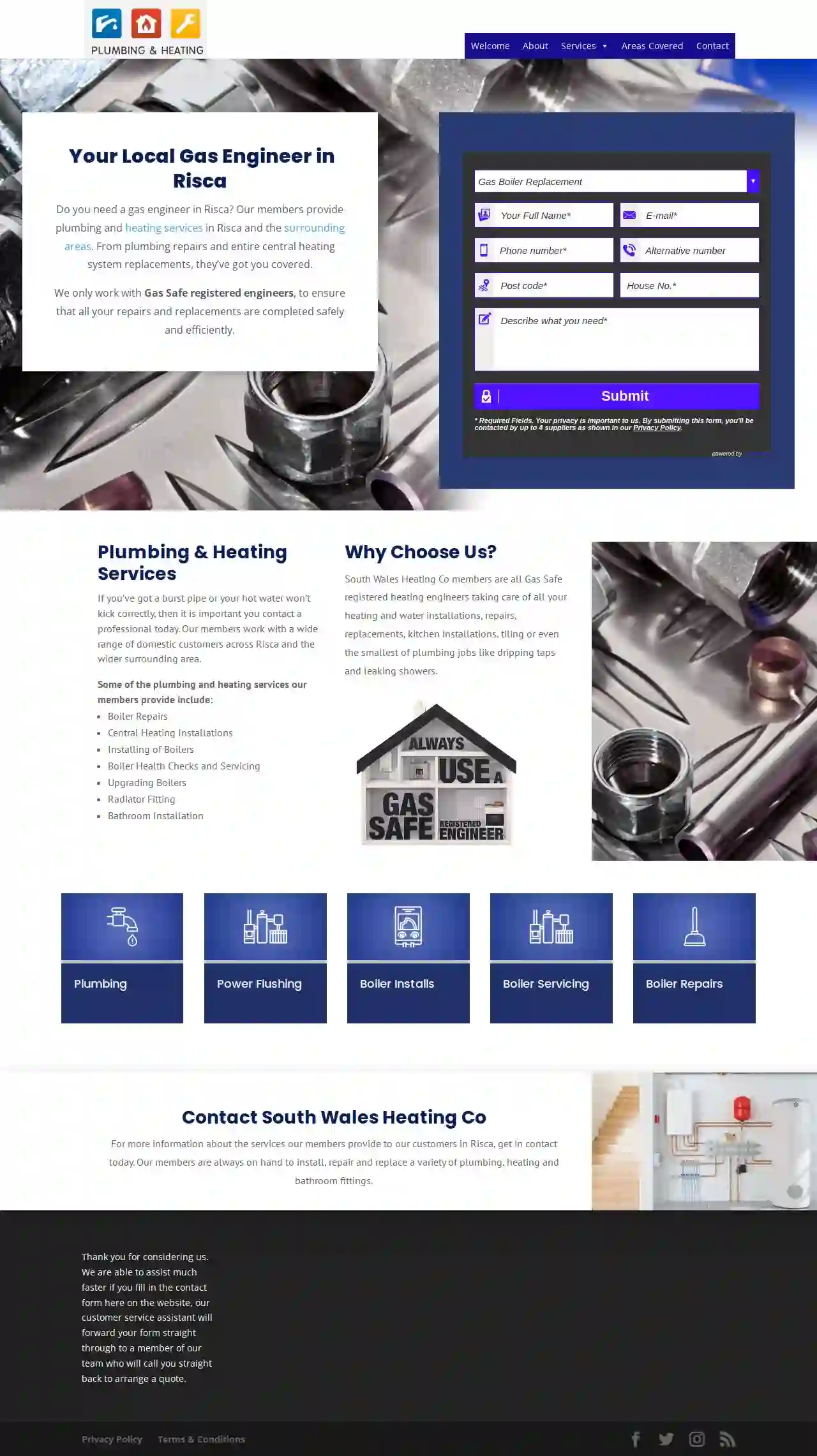
Haines Heating Services
Enfield, GBYour Local Gas Engineer in Risca Do you need a gas engineer in Risca? Our members provide plumbing and heating services in Risca and the surrounding areas. From plumbing repairs and entire central heating system replacements, they’ve got you covered. We only work with Gas Safe registered engineers, to ensure that all your repairs and replacements are completed safely and efficiently. Plumbing & Heating Services If you’ve got a burst pipe or your hot water won’t kick correctly, then it is important you contact a professional today. Our members work with a wide range of domestic customers across Risca and the wider surrounding area. Some of the plumbing and heating services our members provide include: Boiler Repairs Central Heating Installations Installing of Boilers Boiler Health Checks and Servicing Upgrading Boilers Radiator Fitting Bathroom Installation Why Choose Us? South Wales Heating Co members are all Gas Safe registered heating engineers taking care of all your heating and water installations, repairs, replacements, kitchen installations, tiling or even the smallest of plumbing jobs like dripping taps and leaking showers. Plumbing Power Flushing Boiler Installs Boiler Servicing Boiler Repairs Contact South Wales Heating Co For more information about the services our members provide to our customers in Risca, get in contact today. Our members are always on hand to install, repair and replace a variety of plumbing, heating and bathroom fittings
- Services
- Why Us?
- Gallery
Get Quote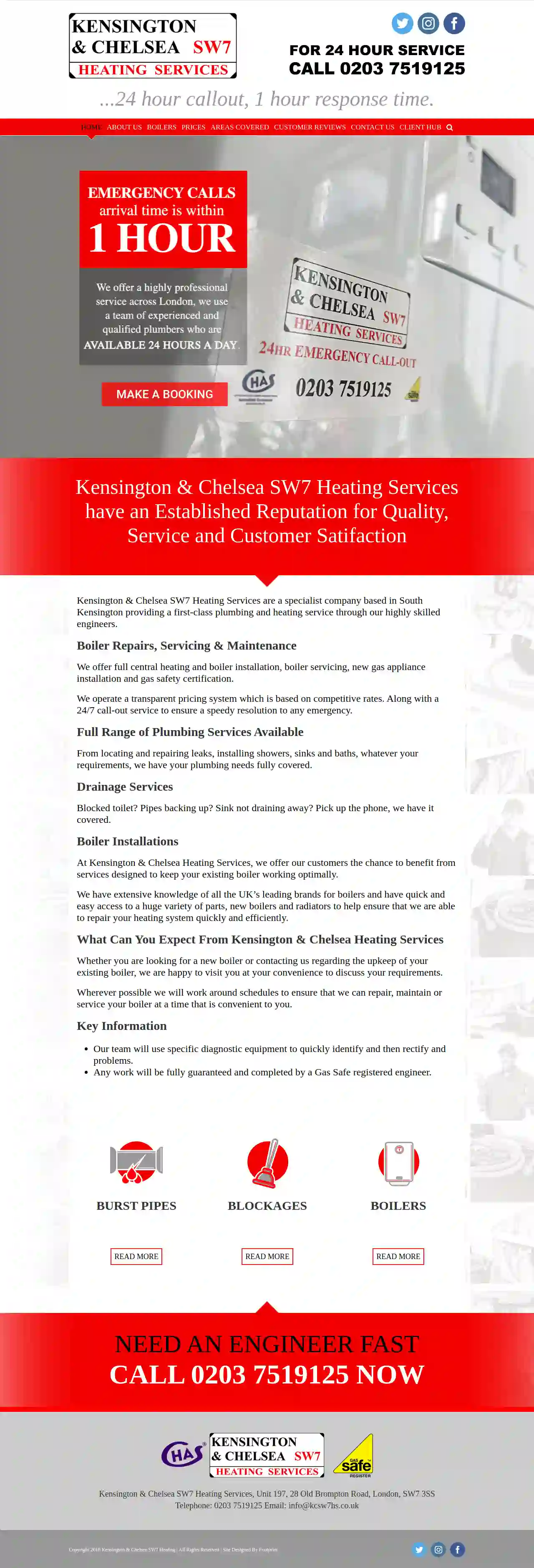
Kensington & Chelsea Heating Services Ltd
565 reviewsUnit 197, 28 Old Brompton Road, London, SW7 3SS, GBKensington & Chelsea SW7 Heating Services is a specialist heating company based in South Kensington providing first-class workmanship to its customers. We are a small, local, customer-driven company with a team of highly experienced engineers who are experts in their field. With many years experience of working in the plumbing & heating sector, we are ideally positioned to install, maintain, service, upgrade and repair all central heating systems throughout London. We are very proud of our reputation for providing outstanding customer service and generating outstanding results time after time. Not only do we cover all aspects of plumbing, heating and gas related work in Kensington & Chelsea and the surrounding area, we also provide a 24-hour emergency call-out service. The Kensington & Chelsea SW7 Heating Services Philosophy Kensington & Chelsea SW7 Heating Services aim to keep things simple. Provide excellent value for money, work quickly and tidily and provide long lasting results each and every time. Our team of plumbers will arrive when they say they will and we will do all that we can to provide you with a level of service that you will be happy to recommend to family and friends. Transparency We do not charge a call-out fee & we also provide free estimates. Our labour charges are competitive and no hidden costs are added to your bill once the work has been completed. The following rates do not include cost of materials or VAT.
- Services
- Why Us?
- Accreditations
- Gallery
Get Quote
Groves Gas
594 reviewsCourt Road Industrial Estate, Cwmbran, Unit 28, NP44 3AS, GBGroves Gas is a family-run business established in 2006 with the goal of becoming the leading independent gas, plumbing, and heating company in Wales. We prioritize customer satisfaction without compromising on safety and quality. Our services encompass a wide range of gas, oil, and heating solutions, including boiler installations, servicing, and repairs, stove and fire installations, landlord contract servicing, electrical installations, powerflushing, and warm air central heating services. We are proud to be GAS SAFE, OFTEC, and HETAS accredited, ensuring our work meets the highest industry standards. As Worcester Bosch accredited partners, we utilize top-quality products and materials to deliver exceptional results. We also offer comprehensive service plans to protect your appliances and provide peace of mind. Whether you need a new boiler, stove installation, or routine maintenance, Groves Gas is your trusted partner for all your heating and plumbing needs in South Wales.
- Services
- Why Us?
- Accreditations
- Our Team
- Testimonials
- Gallery
Get Quote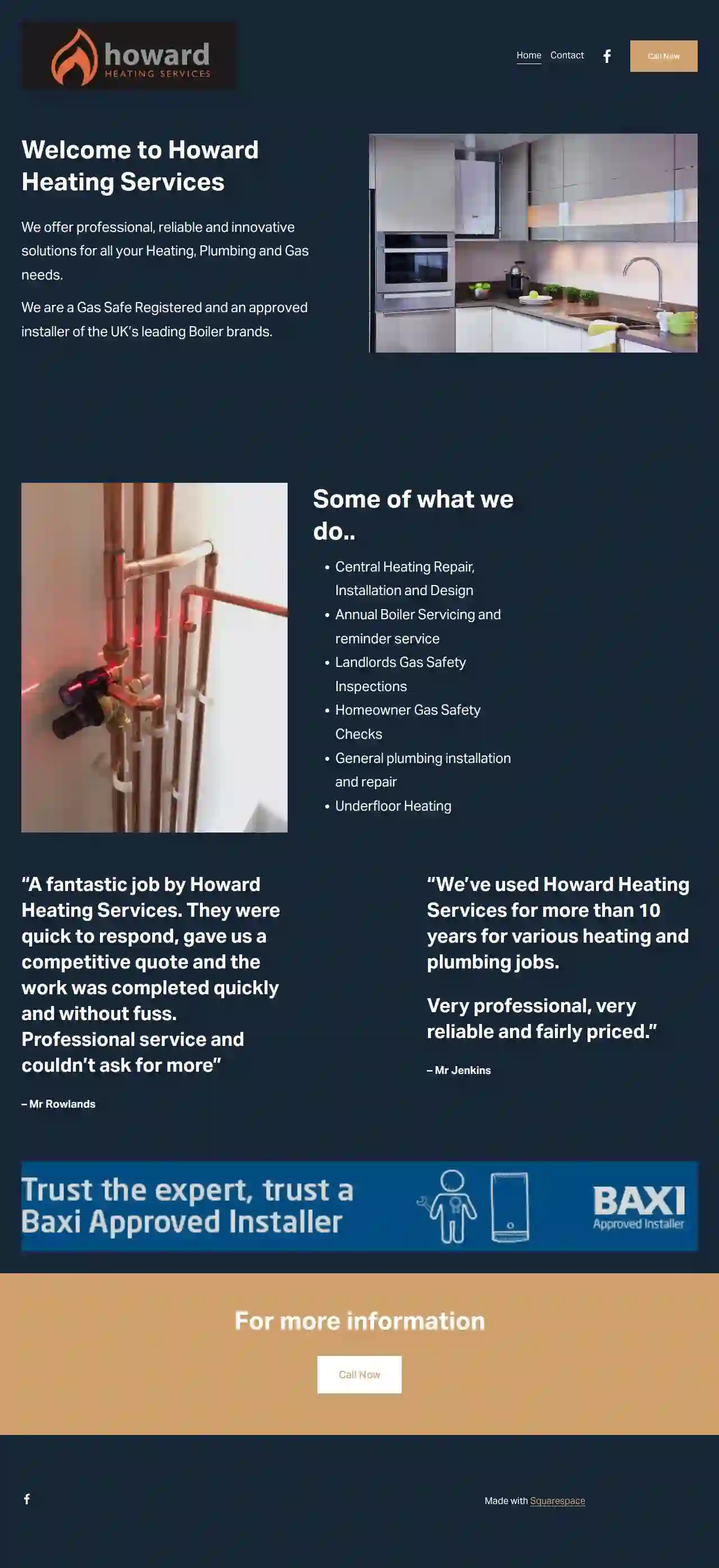
Howard Heating Services
54 reviews16 Churchwood, Pontypool, NP45SX, GBWelcome to Howard Heating Services. We offer professional, reliable and innovative solutions for all your Heating, Plumbing and Gas needs. We are a Gas Safe Registered and an approved installer of the UK’s leading Boiler brands. Some of what we do: Central Heating Repair, Installation and Design Annual Boiler Servicing and reminder service Landlords Gas Safety Inspections Homeowner Gas Safety Checks General plumbing installation and repair Underfloor Heating “A fantastic job by Howard Heating Services. They were quick to respond, gave us a competitive quote and the work was completed quickly and without fuss. Professional service and couldn’t ask for more”– Mr Rowlands “We’ve used Howard Heating Services for more than 10 years for various heating and plumbing jobs. Very professional, very reliable and fairly priced.”– Mr Jenkins For more information Call Now
- Services
- Why Us?
- Accreditations
- Our Team
- Testimonials
- Gallery
Get Quote
North London Plumbing & Heating - Domestic Plumber, Boiler Installations & Repairs Palmers Green
53 reviewsPalmers Green, North London, 16c Broomfield Lane, N13 4HB, GBNorth London Plumbing Heating & Builders Ltd is a trusted and reliable plumbing company in North London, with 30 years of experience. We pride ourselves on delivering exceptional service to our valued customers, with a commitment to quality, integrity, and innovation. Our team of highly skilled and experienced professionals is dedicated to understanding your unique needs and bringing your vision to life. We believe in open communication and collaboration with our clients throughout the entire plumbing process, ensuring that your expectations are met and exceeded.
- Services
- Why Us?
- Testimonials
- Gallery
Get Quote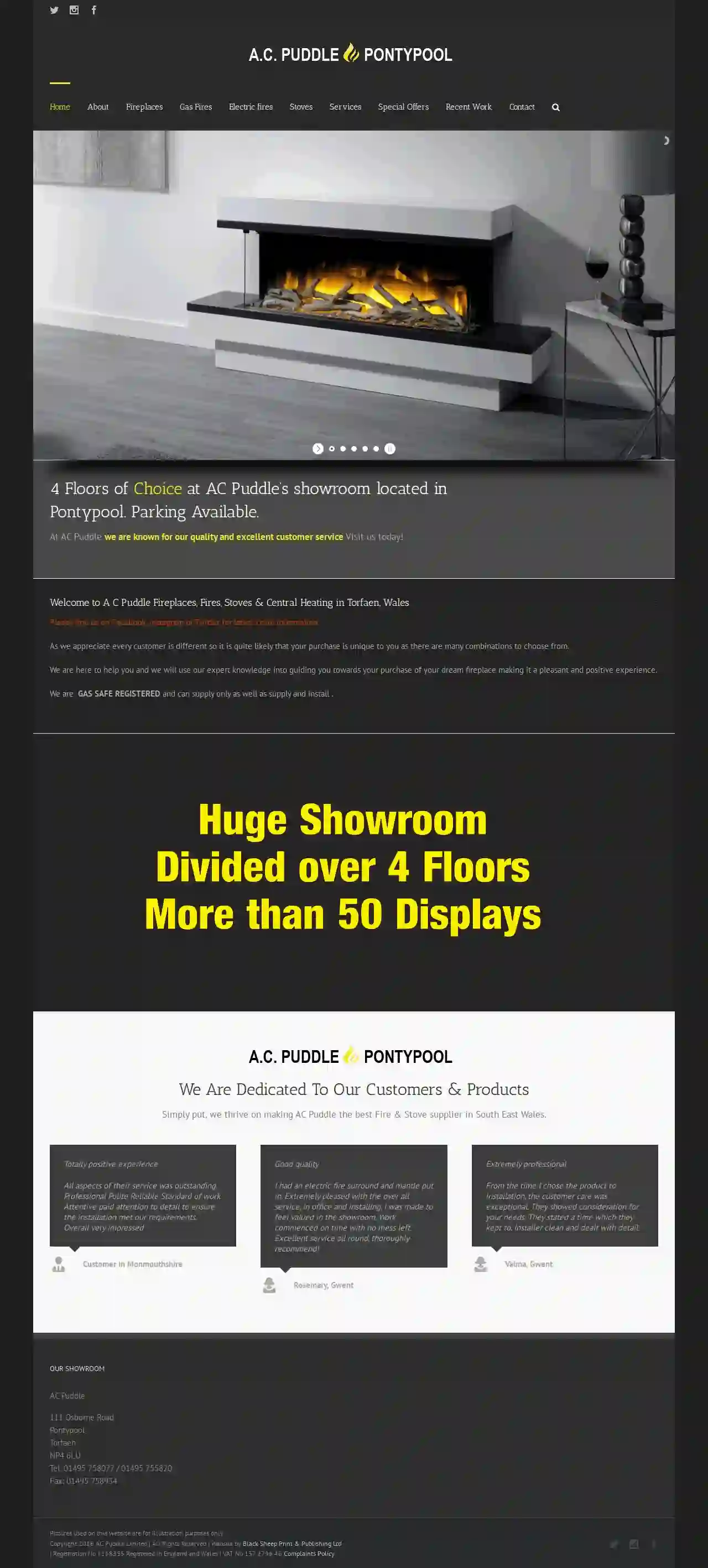
Puddle A C & Co Ltd
4.923 reviews111 Osborne Road, Pontypool, NP4 6LU, GBAt AC Puddle we are known for our quality and excellent customer service Visit us today! We are here to help you and we will use our expert knowledge into guiding you towards your purchase of your dream fireplace making it a pleasant and positive experience. We are GAS SAFE REGISTERED and can supply only as well as supply and install . We Are Dedicated To Our Customers & Products Simply put, we thrive on making AC Puddle the best Fire & Stove supplier in South East Wales.
- Services
- Why Us?
- Testimonials
- Gallery
Get Quote
Airpure ventilation, condensation and mould specialist
57 reviewsCwmbran, GBCondensation Control and Mould Specialists, we offer you solutions to your moisture-related house problems and methods to keep them away for good!AirPure services include: Site Surveys for Mould and Condensation Issues Installation of Intelligent Condensation Control Systems including Kitchen and Bathroom Extractor Fans and Positive Input Ventilation Systems Mould Eradication Treatment including Wash Down of Mould and the Option of a Mould Inhibiting Paint Barrier. A 2-year Guarantee that the Mould will NOT return (where recommended ventilation and treatment systems are installed)
- Services
- Why Us?
- Gallery
Get Quote
INTEGRITY HEATING AND COOLING LLC
4.311 reviewsChicopee, 01020, GBVeteran owned and operated 24/7 Emergency services Based in Chicopee, MA Contact Us! Financing A Reliable HVAC Contractor You Can Trust Your HVAC system plays a major role in keeping you comfortable at home or at work. That’s why it’s important to care for your system with regular maintenance and repairs. Whether you’re dealing with a heating issue or want to update your system, you can depend on Integrity Heating and Cooling. We provide top-notch heating and cooling services in the Western, MA area.Get in touch with our HVAC contractor to increase your system’s energy efficiency without breaking the bank. 10% Discount for Seniors and Military on services!Call us at (413) 657-1213 or fill out the form below.
- Services
- Why Us?
- Our Team
- Testimonials
- Gallery
Get Quote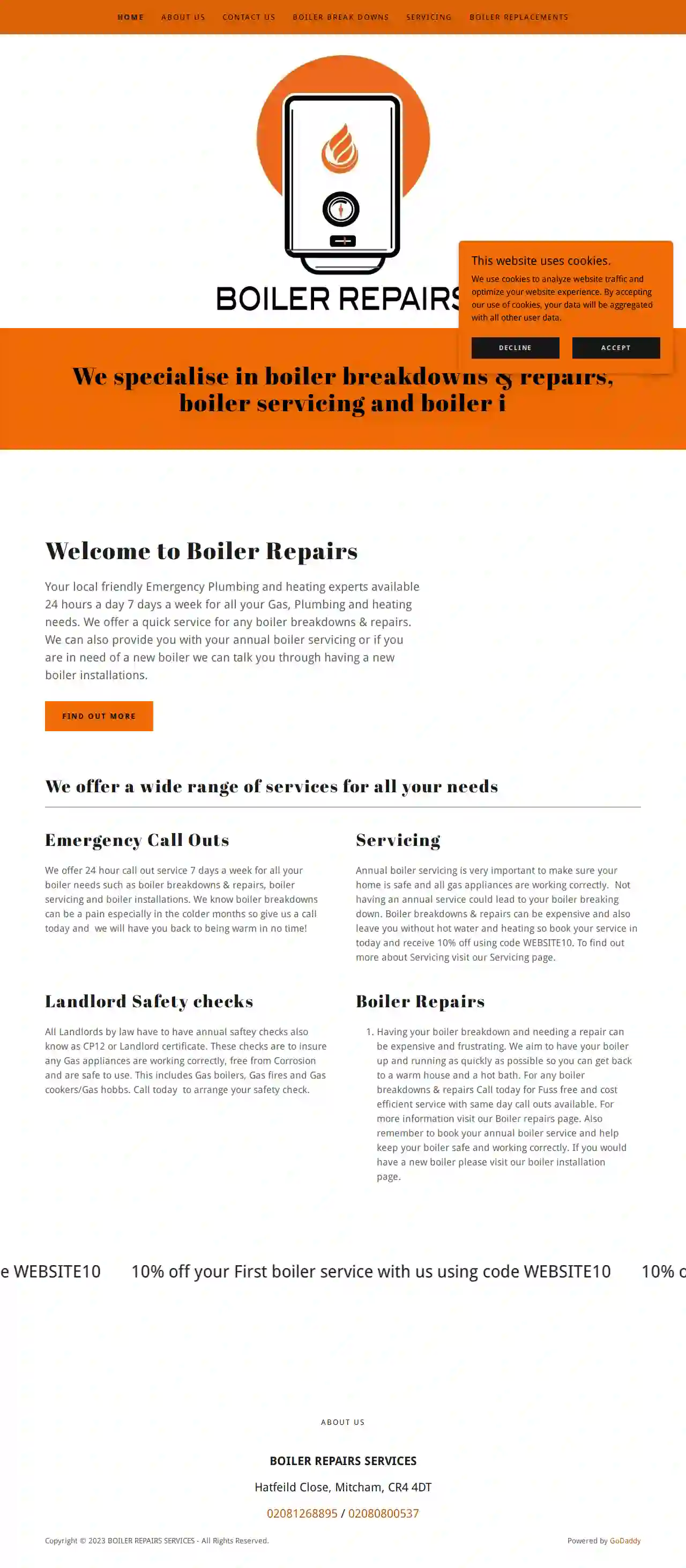
Boiler repairs
533 reviewsHatfeild Close, Mitcham, CR4 4DT, GBWelcome to Boiler Repairs. We offer 24 Hour Emergency boiler breakdowns. Here at Boiler repairs we specialise in Gas and Heating repairs on all brands of Gas boilers. We offer same day call outs and same day repairs where possible, All engineers are fully qualified and Gas safe with over 10 years experience. We strive to be the best and take customer service very seriously. We aim to provide the best service at a great price and like to leave our customers happy, satisfied and warm! We specialise in boiler breakdowns, boiler servicing, boiler installations and much more!
- Services
- Why Us?
- Gallery
Get Quote
Blue Mountain Air Conditioning Ltd
52 reviews318 Woodside way, Springvale Industrial Estate, Cwmbran, Torfaen, NP44 5BR, GBBlue Mountain Air Conditioning is a company that specializes in all aspects of air conditioning and ventilation. We provide a range of air conditioning and air handling units which are used to regulate and circulate air as part of a heating, ventilation and air conditioning system (HVAC). Our experts at Blue Mountain will ensure you are delivered the highest quality and most cost-effective cooling, heating and humidity control requirements for your building, ensuring that your environment is kept at an ideal temperature to deliver ultimate comfort. We understand the importance of minimizing downtime of equipment when problems occur. That's why we are proud to offer a year-round 24/7 call-out service, providing our customers with peace of mind. We have also gone green, committed to reducing our carbon footprint in every aspect possible. We work with only the highest standard of equipment in order to make sure our systems are as economically friendly as possible. All of our engineers are now equipped with digital assistants, meaning paperwork is now a thing of the past.
- Services
- Why Us?
- Testimonials
- Gallery
Get Quote
Over 12,692+ HVAC Companies in our network
Our HVAC pros operate in East Barnet & surroundings!
HVACCompaniesHub has curated and vetted the Best HVAC Contractors arround East Barnet. Find a top & trustworthy contractor today.
Frequently Asked Questions About HVAC Companies
- Your home's square footage
- Your local climate
- Insulation levels
- Window efficiency
- Number of occupants
- Split Systems: The most common type, consisting of an outdoor unit (condenser/compressor) and an indoor unit (air handler/furnace).
- Heat Pumps: Provide both heating and cooling by transferring heat between indoor and outdoor air.
- Ductless Mini-Splits: Ideal for homes without existing ductwork or for adding heating and cooling to specific zones.
- Packaged Units: A single unit that contains all the system's components.
- Geothermal Heat Pumps: Use the earth's stable temperature to provide highly efficient heating and cooling.
- Experience: Choose a contractor with extensive experience in the HVAC industry, especially in the type of service you need.
- Licensing and Insurance: Verify that the contractor is properly licensed and insured.
- Certifications: Look for NATE (North American Technician Excellence) certification, which indicates a high level of technical competency.
- Reputation: Check online reviews and ratings to assess the contractor's reputation and customer satisfaction levels.
- References: Ask for references from past customers and contact them to inquire about their experience.
- Estimates and Quotes: Get written estimates or quotes from multiple contractors to compare pricing and services.
- Warranty Information: Ask about warranties on equipment and labor.
- Communication: Effective communication is key. Choose a contractor who responds promptly and clearly answers your questions.
What is a SEER rating, and why is it important?
How do I choose the right size AC unit for my home?
What are the different types of HVAC systems?
How do I choose the right HVAC contractor?
What is a SEER rating, and why is it important?
How do I choose the right size AC unit for my home?
- Your home's square footage
- Your local climate
- Insulation levels
- Window efficiency
- Number of occupants
What are the different types of HVAC systems?
- Split Systems: The most common type, consisting of an outdoor unit (condenser/compressor) and an indoor unit (air handler/furnace).
- Heat Pumps: Provide both heating and cooling by transferring heat between indoor and outdoor air.
- Ductless Mini-Splits: Ideal for homes without existing ductwork or for adding heating and cooling to specific zones.
- Packaged Units: A single unit that contains all the system's components.
- Geothermal Heat Pumps: Use the earth's stable temperature to provide highly efficient heating and cooling.
How do I choose the right HVAC contractor?
- Experience: Choose a contractor with extensive experience in the HVAC industry, especially in the type of service you need.
- Licensing and Insurance: Verify that the contractor is properly licensed and insured.
- Certifications: Look for NATE (North American Technician Excellence) certification, which indicates a high level of technical competency.
- Reputation: Check online reviews and ratings to assess the contractor's reputation and customer satisfaction levels.
- References: Ask for references from past customers and contact them to inquire about their experience.
- Estimates and Quotes: Get written estimates or quotes from multiple contractors to compare pricing and services.
- Warranty Information: Ask about warranties on equipment and labor.
- Communication: Effective communication is key. Choose a contractor who responds promptly and clearly answers your questions.